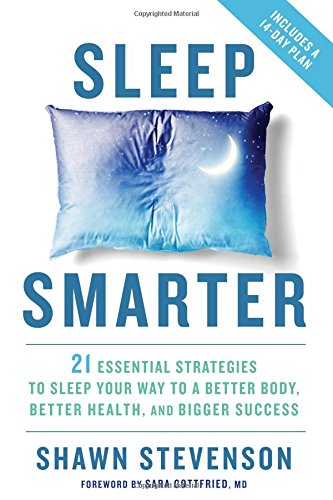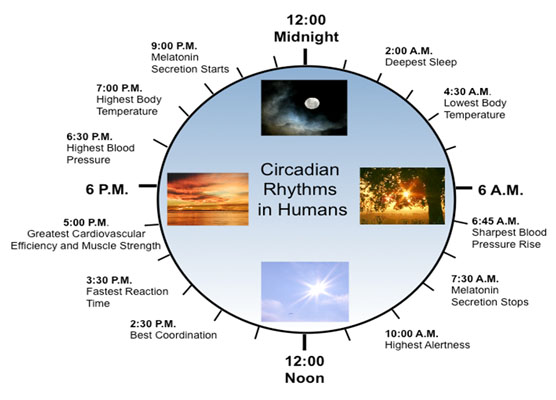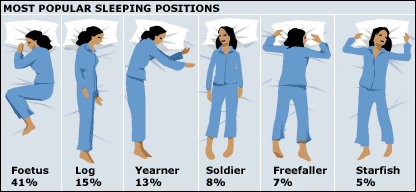Over the last few decades technology has shaped the way we sleep – and not in a good way. From an abundance of artificial light to constant stimulation from social media and blue light emitted from screens, it’s harder than ever to get a good night’s sleep. Even when we do manage that elusive 8 hours, how much of that was spent sleeping? Did we fall asleep instantly and avoid waking up in the night, or was it more fractured than that? Getting 8 hours still carries no guarantees, as you’ll learn in this book the quality of sleep plays a huge role.
Factors like room temperature and lighting, sleep position, diet and lifestyle can all influence the quality of our sleep. This book details 21 of these “sleep smarter” strategies which are easy to implement and can make an immediate impact on how you sleep. The benefits of utilising these strategies include: better skin, decreased risk of stroke, lower levels of inflammation, faster weight loss and increased longevity. If you are someone who has trouble falling asleep or often wakes up still tired, then I strongly recommend you read this book.
Book fifteen is…
Sleep Smarter by Shawn Stevenson

PRO TIP: Take notes! When you read a book, use a blank sheet of paper as a bookmark. Write down any interesting facts and information from the book. This condenses a whole book into 3-4 pages of key notes that are important and relevant to you.
My Notes
- Studies have shown one night of sleep deprivation can make you as insulin resistant as a person with Type II Diabetes. It can lead to faster ageing, decreased libido and body fat storage increase.
- 60% of the US population have trouble sleeping
- 24 hour sleep deprivation leads to 6% less glucose going to the brain. This leads to a sugar craving and a 12-14% decrease in decision making.
- AASM study showed sleep deprivation comparable to binge drinking or marijuana use in determining academic performance.
- A study of physicians showed sleep deprivation led to 14% increase in time to complete tasks and 20% higher error rate.
- Brain cells shrink 60% during sleep to accommodate regeneration
- Your sleep cycle is heavily impacted by sunlight exposure in the day

Natural Circadian Rhythm of Humans
- Too little sunlight in the day and too much artificial light in the evening negatively impacts your ability to sleep well
- Our eyes adapt to changes in brightness so well we don’t realised that indoors is around 100 times less bright than a sunny day outdoors, and 10 times less than a cloudy day outdoors.
- An office worker without direct access to windows was shown to have a third as much natural light exposure and slept 46 minutes less each night
- The best time of day for light exposure is 6.30-8.30am, so try to prioritise exposure even if it’s a cloudy day
- Too much dopamine from social media increases feelings of wakefulness
- Avoid screens (blue light) 90 minutes before bed
- Turn off mobile phone notifications from social media to reduce dopamine surges
- Consuming caffeine increases cortisol and adrenaline. It also causes vasoconstriction, so when withdrawing you get vasodilation and wider blood vessels, leading to headaches
- A temporary reduction in digestive flow is common on caffeine withdrawal, increasing fibre and water intake softens the blow
- The optimal sleep temperature is 60 to 68°F (15-19°C)
- Take a warm bath 90-120 minutes before bed as the increase in body temperature will then initiate a drop and aid sleep
- Wear loose socks to bed if you have poor circulation, as cold extremities can prevent sleep
- Humans get the most beneficial hormone secretions and recovery from sleeping 10pm-2am. Depriving yourself of these key hours can mean you get 8 hours sleep but don’t feel rejuvenated.
- Automated repair of the body occurs at 10-11pm and if you’re awake in this time it can feel like a ‘second wind’ of wakefulness
- Depriving sleep in key hours has led some researchers to classify overnight shift work as a Group 2A carcinogen (same as UVA radiation)
- Varying sleep cycles within the same week on a regular basis can be as damaging as consistent late shifts
Foods clinically proven to damage gut microbiome (affecting sleep) include:
- Agricultural chemicals (e.g. pesticides)
- Processed foods (excess sugar feeds ‘bad’ bacteria)
- Haphazard antibiotic use
- Chemical food additives
- Chlorinated water
- Diet soda can interfere with microbiome and metabolism
Nutrients
- Selenium: a deficiency can lead to sleep abnormalities
- Selenium can be found in: Brazil Nuts, Sunflower Seeds, Beef, Oysters , Chicken
- Vitamin C: a deficiency leads to waking up in the night
- Vitamin C can be found in: Bell Peppers, Green Leafy Veg, Kiwi Fruit, Strawberries, Citrus Fruits
- Tryptophan: it’s a precursor to serotonin production
- Tryptophan can be found in: Turkey, Chicken, Eggs, Sweet Potatoes, Bananas, Pumpkin Seeds, Natural Yoghurt
- Vitamin D can be obtained from natural sunlight, so where exposure is difficult you should consider supplementing with Vitamin D3
- Omega 3: this helps achieve deeper sleep
- Omega 3 can be found in: Chia Seeds, Pumpkin Seeds, Walnuts, Salmon, Flax Seeds. They are damaged in excess heat so better taken cold
- Magnesium: balances blood sugar, optimises circulation, relaxes tense muscles and calms the nervous system. It’s estimated that 45-80% of the US population could be deficient
- A large % of ingested magnesium is lost in the digestive process. For this reason it’s recommended to try using Epsom salts (Magnesium sulfate) in a hot bath*
- Use a topical spray, author recommends “Ease Magnesium”. Apply topical Magnesium cream before bed, do this on anywhere sore, the centre of your chest, around your neck and shoulders. 4-6 sprays per area
- Food sources of magnesium: Green Leafy Veg, Pumpkin Seeds, Spirulina, Brazil Nuts.
*I used to train as a 100m sprinter at University and our coach recommended Epsom Salt baths when we had a few days to recover. Try 500g in a VERY hot bath, also physically rub the salts on any particularly tight, sore or tired muscles. You will feel very relaxed afterwards, so much so it’s best not to exercise for 48 hours.
More Notes
- Prolactin release during orgasm induces tiredness and is partly why men can’t immediately ‘go again’. There is 4x more released when climaxing with a partner vs alone
- Exposure to room light during sleeping hours leads to >50% decrease in production of melatonin
- Cover your alarm clock light, switch to red bulbs or candle light in the evenings
- Your room should be dark enough when sleeping that you can’t see your hand in front of your face
- The best time to work out for optimal sleep is the morning. Core body temperature is raised for 4-6 hours after exercise, which would interfere with sleep.
- Listen to the authors podcast The Model Health Show
- People with heavy mobile phone use as teenagers have 4-5x more incidence of brain cancer
- 4 hours of wireless internet connected laptop exposure led to a significant decrease in progressive sperm motility in men
- Cortisol (stress hormone) rose 5% after a meal in healthy subjects, 50% for obese subjects!
- Up to 70% of the weight lost in traditional calorie restriction diets is lean muscle tissue
- Alcohol reduces high quality REM sleep
- Sleep apnea affects 18 million Americans
- For every alcoholic drink you have, your body can expel up to 4x as much volume of liquid

- If sleeping on your BACK, avoid a big pillow as your spine is misaligned and makes it harder for blood to reach the brain
- If sleeping on your BELLY, bring one knee up to the side, remove the pillow from under your head and use it to lift hips
- If sleeping on your SIDE, avoid a big pillow, use a pillow between your knees if you suffer back pain and shift so you aren’t directly pressing down on your shoulder
- Meditation can minimise ‘chatter’ from thinking at night and improve focus in the day. It’s also shown to help with insomnia.
- Avoid worrying too much, as the body reacts as if the event is actually happening and increases stress levels.
- The best times to meditate are upon waking or before bed, but don’t meditate in bed
- Chamomile tea before bed can help you sleep faster, also Valerian root
- Melatonin is a hormone and by supplementing you will have a negative effect on the endogenous (own bodies) production of it
- 5 minute “gut smash” by Kelly Starrett using a semi-deflated football before bed can help down regulation
- Add other foam roll work in before bed, 5-10 minutes should suffice
- Avoid tight clothes in bed, usually socks to blame, as it restricts waste removal by your body
- Electron transfer from food means we need to ‘ground’ by being in direct contact with the earth. You can get an earthing mat to sleep on, or go barefoot on soil/grass/sand every day
- Earthing is particularly beneficial after a long haul flight
- Page 194-240 includes a detailed 14 Day Sleep Makeover (buy the book to see it!)
- Bonus content can be found here
As you can see, this book is PACKED with information and it really will revolutionise how you spend 1/3 of your life.

